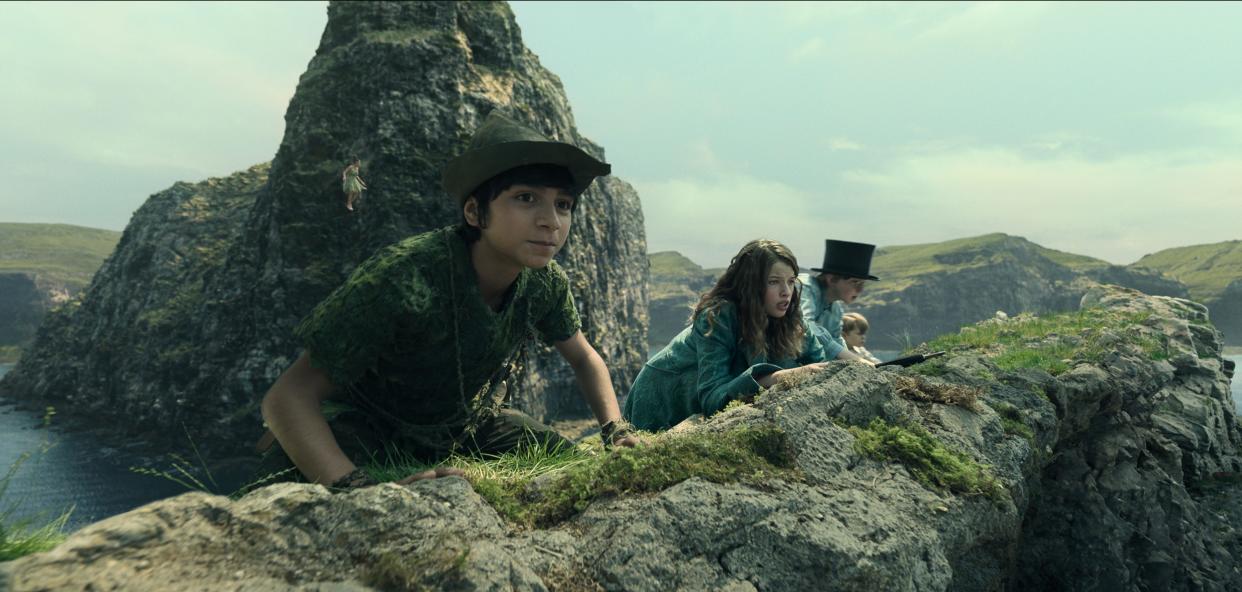Latest take on 'Peter Pan' doesn't avoid typical story traps

When I heard Disney Plus would premiere “Peter Pan & Wendy” this past week, I did a double take. Didn’t we just have a Peter Pan movie a few years ago?
Eight years ago, in fact, when Joe Wright’s “Pan” debuted to middling reviews and a healthy box-office haul that still didn’t make back its oversized budget. But locating that title also unearthed P.J. Hogan’s 2003 “Peter Pan.” The reviews were better, but it too failed to make back a nine-figure budget.
This stroll down the halls of “Peter Pan” remakes shouldn’t ignore Benh Zeitlin’s “Wendy,” a grungy, indie re-imagining largely ignored by history thanks to its inglorious release date of March 13, 2020. I doubt you were at a movie theater that weekend either.
Now, David Lowery has filmed the fourth version of The Boy That Never Grew Up in 20 years. Why does Hollywood keep coming back to this story despite noted apathy from audiences?
More: Spend time with one of cinema's best neighbors when 'Totoro' screens at Stephens Lake Park
There’s no point in belaboring the plot because surely you know it. At its core, the idea of never growing up must hold resonance for filmmakers who see studio sets as sandboxes and actors as model toys. Filmmakers must retain some spark of innocent wonder to continue pursuing big ideas and insurmountable projects time after time.
It must also stick with studio executives, who see the modern audience as men in a perpetual state of arrested development. Nostalgia plays big, after all. Adults flock to films about comic books or video games while treating the films of their youth — like “Stars Wars” — as sacrosanct.
The adoration of such properties assumes a chokehold on childhood. A period of our life that must never be discarded. This same audience could relate to Peter Pan, the suits might think. I mean who wants to grow up and worry about mortgage payments and deadlines at work? Seems like a fantasy with plenty of material to extract.
As an aside, this was the starting point for Steven Spielberg’s “Hook.” Peter Pan did grow up into a miserable adult and had to go back to Neverland to un-learn everything he knew about being an adult. That movie remains one of Spielberg’s worst misfires with critics and crowds.
Sensing a pattern?
There’s never been a Peter Pan film — at least a live-action version — to really connect with pop culture at-large. The failure could be in the foundation of the story. For kids, who should be the primary audience here, the idea of growing up doesn’t even register. There’s nothing very introspective about being a child, so there’s not much fantasy for them to experience.
For adults, always looking to get their kids out of the house, there is a desire to see characters develop and grow as a story goes along. In writing classes, you are taught the measure of a tale’s success is where the characters end their journey as opposed to where they began.
Peter Pan never changes. He has no desire to change. Nor do the Lost Boys, who follow him around like emotionally-stunted disciples. At least in Lowery’s version, there’s an effort to provide some background for Captain Hook (Jude Law), typically just a foil who twirls a synthetically-applied mustache.
Hook explains, in an extended monologue, that he once was a Lost Boy and had a falling-out with Pan. Which led to a hand getting cut off and to a crocodile. You know the rest.
With this psychological coloring, we learn Pan rejects his friend because Hook dared to show a complexity of emotion. Something no grown man-boy should ever tolerate.
Let’s face it — Peter Pan is the bad guy of the story. He’s one-dimensional. Refuses to be anything other than a self-possessed arbiter of what’s “fun” and “whimsical,” no matter what damage he causes. Maybe movies should stop treating him like a hero.
If filmmakers really wanted to reimagine the contours of this fantasy, they might retool the focus. Wendy’s realization that growing up is “a pretty big adventure” in and of itself is right on the money.
More: Love him or hate him, 'Beau is Afraid' — and must be seen
But, even when the character’s name is put into the title, she’s still only a side character. Her arc, when she’s given one, is much more interesting. But it’s never Wendy that these male directors choose to emphasize.
Lowery has said Peter Pan is a “passion project” for him and he seems like an ideal fit. Just a few years ago, he gave us the dazzling medieval epic “The Green Knight.” That’s a compelling (if adult) fantasy that does wonders with a budget one-tenth the size of a usual blockbuster.
He also remade Disney’s “Pete’s Dragon” a few years back, and that version infused a lot of independent personality for such a commercial film.
While he gets close with “Peter Pan & Wendy,” Lowery still falls for all the same traps. It’s a shame. Maybe someday a great director will figure out how to fix this story. Or maybe studios will just realize the story will never work.
But hey, if you dream, anything is possible!
James Owen is the Tribune’s film columnist. In real life, he is a lawyer and executive director of energy policy group Renew Missouri. A graduate of Drury University and the University of Kansas, he created Filmsnobs.com, where he co-hosts a podcast. He enjoyed an extended stint as an on-air film critic for KY3, the NBC affiliate in Springfield, and now regularly guests on Columbia radio station KFRU.
This article originally appeared on Columbia Daily Tribune: Latest take on 'Peter Pan' doesn't avoid typical story traps

